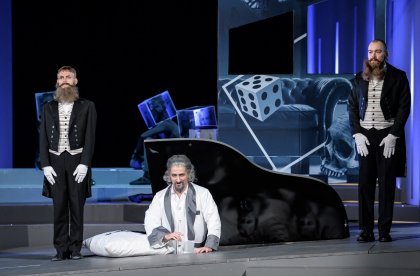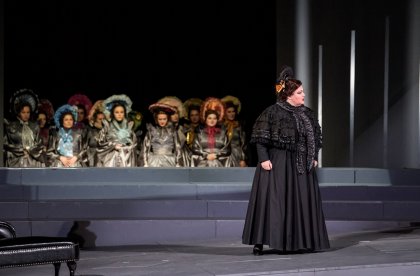Music: Hans Krása (1899–1944)
Libretto: Rudolf Fuchs (1890–1942) a Rudolf Thomas
Based on the novella Uncle’s Dream by Fyodor Mikhailovich Dostoevsky (1821–1881)
Czech translation Vlasta Reittererová
Hans Krása wrote the opera Verlobung im Traum (Betrothal in a Dream), based on F. M. Dostoyevsky’s novella Uncle’s Dream, during a happy period of his life. After short periode in Berlin at the age of 29 he returned to his beloved native Prague to absorb all the intellectual stimuli the Czech capital afforded. Krása liked visiting the renowned Café Arco in the centre of the city, a place at which the Czech artists Emil Filla, Bohumil Kubišta, Antonín Procházka and others got together to immerse in lively debate with their German-speaking colleagues, including Franz Werfel and Egon Erwin Kisch. Among those who frequented the café were Franz Kafka and Milena Jesenská, whom Krása befriended. His name can even be found in Kafka’s Letters to Milena.
Krása created his Verlobung im Traum between 1928 and 1930. The libretto was penned by Rudolf (Rudi) Thomas, editor-in-chief of the Prager Tagblatt daily, and the poet Rudolf Fuchs. Krása plunged into composing immediately upon receiving the final wording of the text, probably in the summer of 1928. Working with the utmost diligence, by the autumn of that year he could present parts of the opera within a private music evening. Those in attendance included Viktor Ullmann, who summed up his impressions in the Bohemia magazine as follows: “He's no professional. His music happens effortlessly as in checkmate. But what arises is a work of noctambulism certainty. [...] Krása's opera-in-progress, based on Dostoevsky's novel Uncle's Dream, promises music of strong substance, unless you ask the gazelle to perform the strong tricks of an elephant. Particularly charming, among the excerpts I could recognise, are the casually and confidently shaped quintet from the first act, with its gentle melody, and the happy idea of an ensemble in connection with the aria 'Casta diva' from Bellini's Norma.” In September 1930, Der Auftakt reported that Krása had completed the opera, which at the time was titled Feďa (Fedya).
read more
The opera is set in Mordasov, a small Russian town, circa 1850. The local archivist recalls a visit paid by one Fyodor Dostoyevsky, a novelist who wanted to be told the story of Zina, a beautiful girl who once lived in the town, the hapless Fedya, the treacherous Pavel, an eccentric prince and Marya Alexandrovna, Zina’s mother, whose scheming muddles up her daughter’s life. Yet the archivist’s job is to record, not assess, stories. He thus merely recounts and leaves it upon the listeners to judge at their own discretion.
The music of Verlobung im Traum is immensely intriguing; even though it is difficult to describe it in words, let us at least try: tone-painting areas, which are suddenly entered by arch-shaped melodies, fascinating, dynamic ensemble scenes, such excesses as a quotation of Bellini’s famous aria “Casta diva”and, above all, perfect chime between the music and the dramatic plot. The opera ends with a modest, simple melody evoking a Russian song, with a wonderful conclusion replete with profound humanity and hope. Apposite is the composer’s comment contained in a theatre programme: “By saying that I have drawn upon Schönberg, I would like to stress that in my compositions I strive to eschew, the unfortunately so popular, writing for the sake of writing, and in complete earnestness I declare that every beat, every recitative, every note even, must be coerced into being bound to the entirety.”
Negotiations with theatres regarding the staging of Krása’s opera were lengthy and complicated. An interest was shown by Erich Kleiber, director of the Staatsoper Berlin, Fritz Busch, principal conductor of the Staatsoper Dresden, and the Opera in Vienna (today the Wiener Staatsoper). The premiere was ultimately, in 1932, agreed to be held at the Neues deutsches Theater in Prague, after the post of director had been assumed by Paul Eger, who had not hesitated and embraced the opportunity. The first performance was scheduled to take place in March 1933, but it had to be postponed owing to one of the lead singers, the alto Lydia Kindermann, who had been cast as Nastassya, falling ill. The opera finally received its premiere on 18 May 1933 within the Maifestspiele, conducted by Georg Széll and staged by Renato Mordo. The performance on 9 June 1933 was broadcast live on Czechoslovak Radio.
Verlobung im Traum met with an enthusiastic response on the part of the audience and critics alike, and was even awarded the Czechoslovak State Prize. The only critic who took issue with the opera was Mirko Očadlík, who wrote that Krása “has gone astray, with his worst fault being that he and his associates have made a hash of Dostoyevsky’s excellent subject”. Yet other renowned figures commended the piece in laudatory reviews – Max Brod in the Prager Tagblatt, Erich Steinhard in Der Auftakt or Hans Heinz Stuckenschmidt in the Berliner Zeitung. A reviewer under the initials V. T. wrote in the Czech newspaper Národní osvobození: “Hans Krása set the outstanding dramatic subject with a surprising maturity and appeal. His ideas are truly singular, concisely rendering the characters and appositely fitting the story. Youth mainly vents here in harmonic trifles, vivid rhythm and sound, and an uncompromising choice of means; yet the work is definitely honest in heart and remarkably effective.”
After World War II, the music material was for a long time deemed lost, until one day the Israeli conductor Israel Yinon came across in a Vienna archive a folio marked “Property of the German Theatre Society in Prague”, which, astonishingly, contained the score of Verlobung im Traum, including Georg Széll’s conducting notes. On the basis of the discovered material, in 1994 the opera was staged anew within a collaboration of the State Opera Prague and the Nationaltheater Mannheim. The revival premiered on 27 March 1994 at the State Opera in Prague, in a production directed by Karel Drgáč.
read less







































